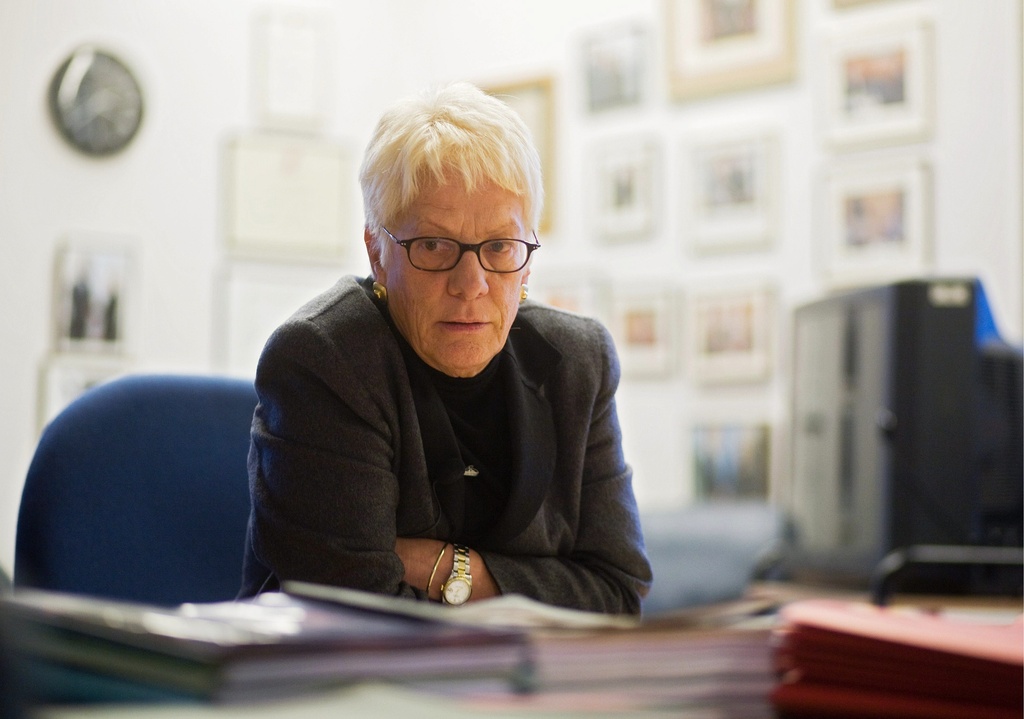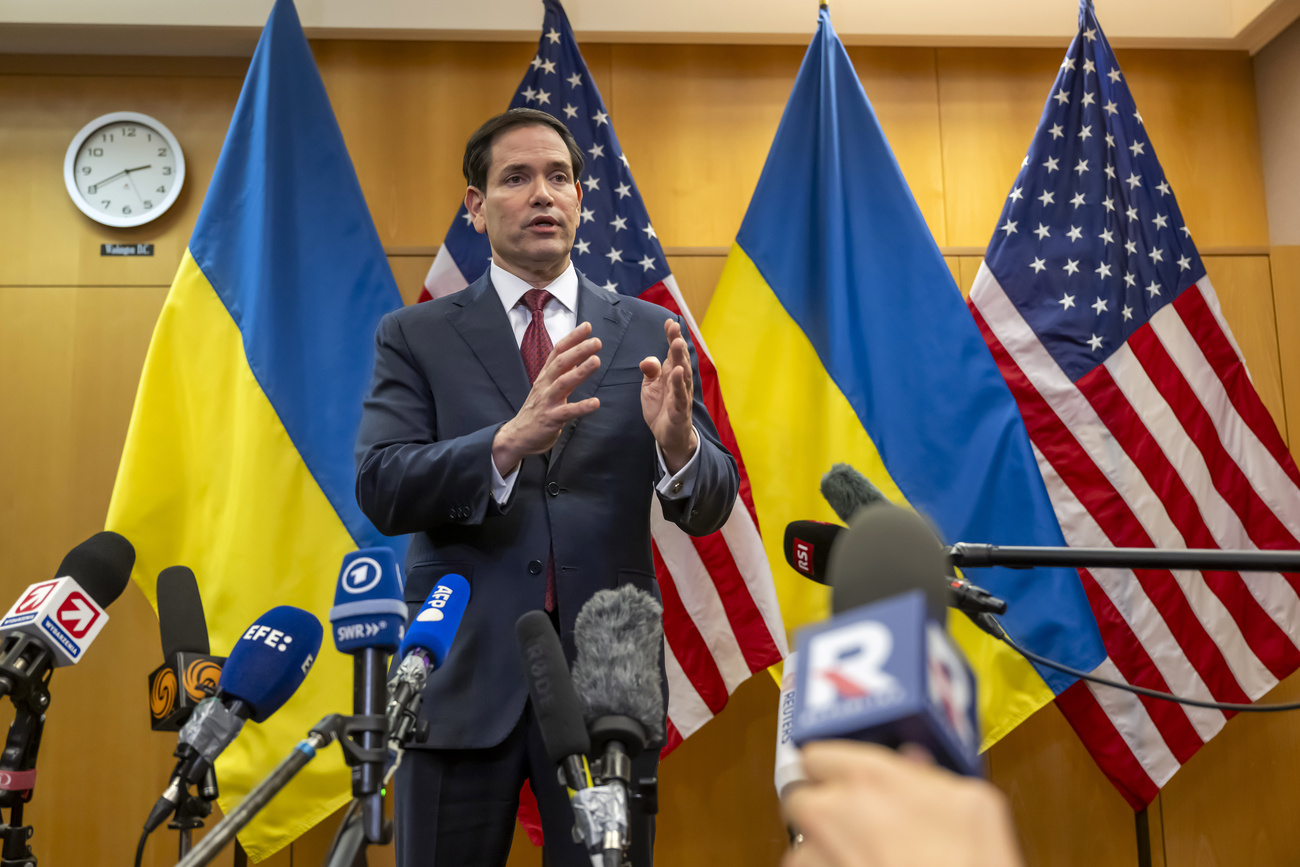
Del Ponte hails ‘great day for international justice’

Following the arrest of Bosnian Serb wartime general Ratko Mladic, former prosecutor Carla Del Ponte tells swissinfo.ch that criminals will always be caught “sooner or later”.
Del Ponte, a Swiss lawyer who was prosecutor of the International Criminal Tribunal for the former Yugoslavia from 1999 to 2007, had previously accused Belgrade of lacking a “focused and coordinated plan” for Mladic’s arrest, calling its handling of the case “unprofessional”.
In April she told a Serbian newspaper that Mladic was in Serbia “because only there can he find protection, thanks to his many friends and sympathisers”.
On Thursday 69-year-old Mladic was arrested at a relative’s home in a tiny Serbian village after a 16-year hunt for the architect of what a war-crimes judge called “scenes from hell”.
Serbian president Boris Tadic said the process had begun of extraditing the former general to the United Nations war crimes tribunal in The Hague, in the Netherlands.
Mladic faces life imprisonment if tried and convicted of genocide and other charges.
swissinfo.ch: What are your feelings now that Ratko Mladic has been arrested?
Carla Del Ponte: This is first and foremost a great day for international justice, particularly for the International Criminal Court. Today we’ve managed to capture one of the people most responsible – along with Karadzic and Milosevic – for the terrible crimes committed in the former Yugoslavia.
We worked for more than eight years to be able to ensure their arrest, a result that today has finally become reality. Mladic, like 160 people before him, will then appear before the tribunal in The Hague. Only one person is missing [Goran Hadzic], but I think that he too will soon suffer the same fate.
swissinfo.ch: The capture of Mladic is a signal against impunity?
C. D.P.: Exactly. Having succeeded in capturing him implies that such people can never be considered safe: even if we didn’t manage to get hold of him immediately, sooner or later the work will bear fruit.
The important thing is to never give up, to never stop fighting for justice for all the victims of massacres. That’s why I think the news today will serve as an incentive for other courts – national and international – that fight for the truth.
These crimes do not expire: one day or another the perpetrators will be brought to justice.
swissinfo.ch: When did you feel that the situation was changing and Mladic would be arrested?
C. D.P: As early as 2005-2006, we realised that the context was evolving, especially after the change in the presidency from Vojislav Kostunica to Boris Tadic. In this sense, there have been concrete signs: in fact the police arrested and transferred to The Hague many people who had roles in the conflict.
The real turning point, however, was the arrest of Radovan Karadzic in 2008 – that showed the political will to cooperate fully with the Tribunal.
The arrest of Mladic was more complicated, because you could never pinpoint him in order to capture him. During my mandate, on a couple of occasions the police were on the verge of arresting him, but they arrived too late.
But the activity of the investigators has clearly recently increased and – perhaps also thanks to a little luck – they achieved their aim.
swissinfo.ch: Do the arrests mean there is now less protection in Serbian society for these people?
C. D.P: Above all, the arrests show that the people in question no longer enjoyed institutional protection, as they did at the beginning – there were only private individuals to help them. Someone like Mladic, for example, could still count on a lot of people, particularly former soldiers.
When we learn the precise circumstances of the arrest, it may turn out that one of these acquaintances was no longer willing to protect him. Perhaps it was one of them who enabled the capture.
swissinfo.ch: In light of these recent developments, what is the greatest challenge still facing international justice?
C. D.P: The greatest challenge is to arrest those accused of crimes and then put them on trial. Other important and complex tasks are to be able to carry out the investigation, draw up the charge and obtain the arrest warrant, but usually – with the help of the international community – you can carry those that through to completion.
The difficulty, however, comes afterwards, when the accused is still living in their country and is regarded by people there as a hero, as with Mladic. It’s also the case with Colonel Gaddafi – even if you got an arrest warrant for him, as many want, I doubt he would be captured quickly…
But what matters, ultimately, is the main message which we can express today: justice takes its course and sooner or later brings to account those who have committed crimes.
Carla Del Ponte was born in 1947 in Bignasco, in the southern Swiss canton of Ticino.
She studied international law in Bern, Geneva and Britain.
In 1981 she became Ticino’s chief prosecutor, where she became well known for her fight against money laundering, organised crime and gun running.
Del Ponte was Swiss federal prosecutor from 1994-9.
She was Swiss ambassador to Argentina from 2008-2011.
On August 11, 1999, the United Nations Security Council named Carla Del Ponte prosecutor to the International Criminal Tribunal for Rwanda (ICTR) and of the International Criminal Tribunal for the former Yugoslavia (ICTY).
During her eight year term at the ICTY, 161 people were charged and 94 were brought to trial.
She was replaced as prosecutor to ICTR in 2003. She remained the prosecutor for the ICTY until December 31, 2007.
Ratko Mladic is accused of orchestrating the methodical slaughter of up to 8,000 Muslims from the Bosnian “safe area” of Srebrenica, in the worst massacre in Europe since the Second World War. The dead were bulldozed into mass graves over four days.
It was the culmination of a three-and-a-half-year conflict in which Mladic pounded the besieged city of Sarajevo daily with the artillery, tanks, mortars and heavy machineguns of his Bosnian Serb army, killing 10,000.
The alleged goal was “ethnic cleansing” – the forcible expulsion of Bosnian Muslims, Croats and other non-Serbs to clear Bosnian lands for a Greater Serbia.
(Adapted from French by Thomas Stephens)

In compliance with the JTI standards
More: SWI swissinfo.ch certified by the Journalism Trust Initiative




























You can find an overview of ongoing debates with our journalists here . Please join us!
If you want to start a conversation about a topic raised in this article or want to report factual errors, email us at english@swissinfo.ch.